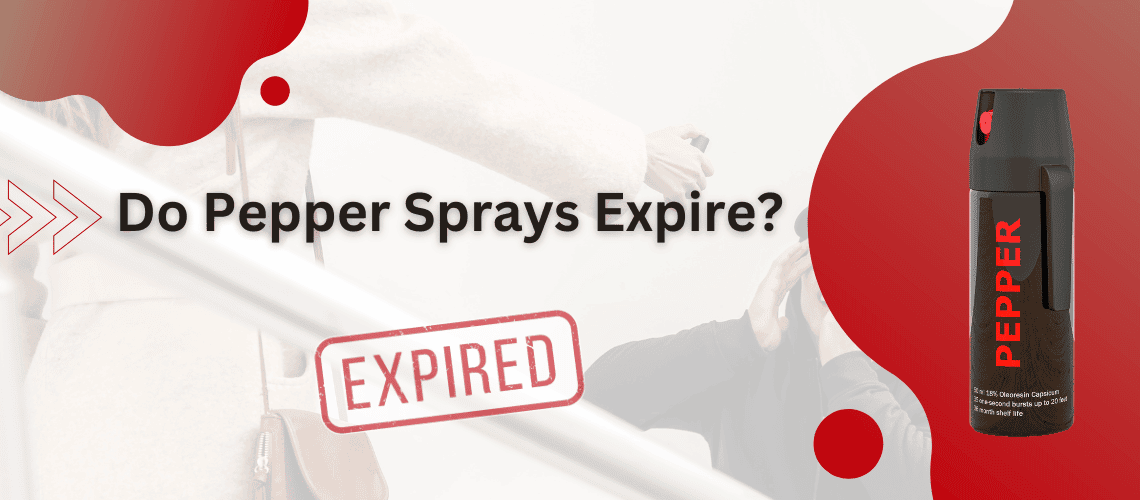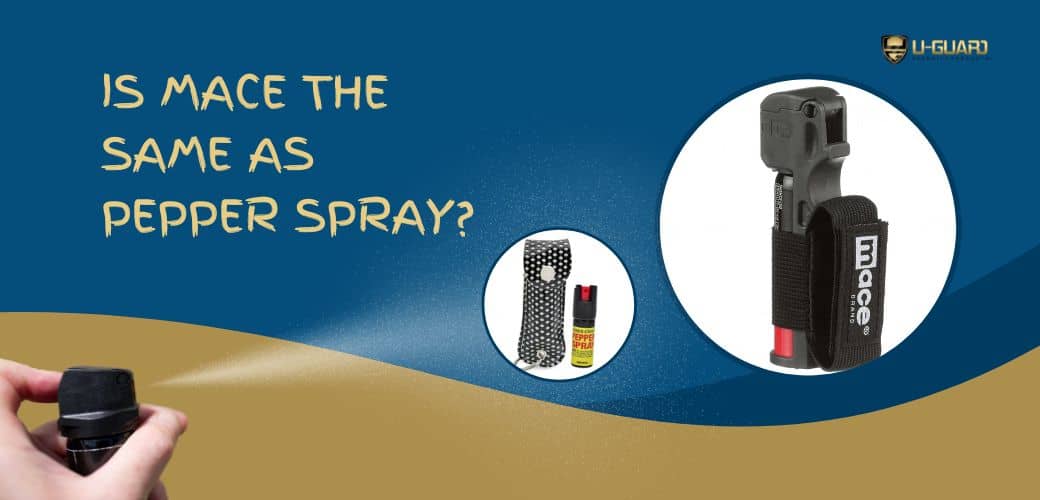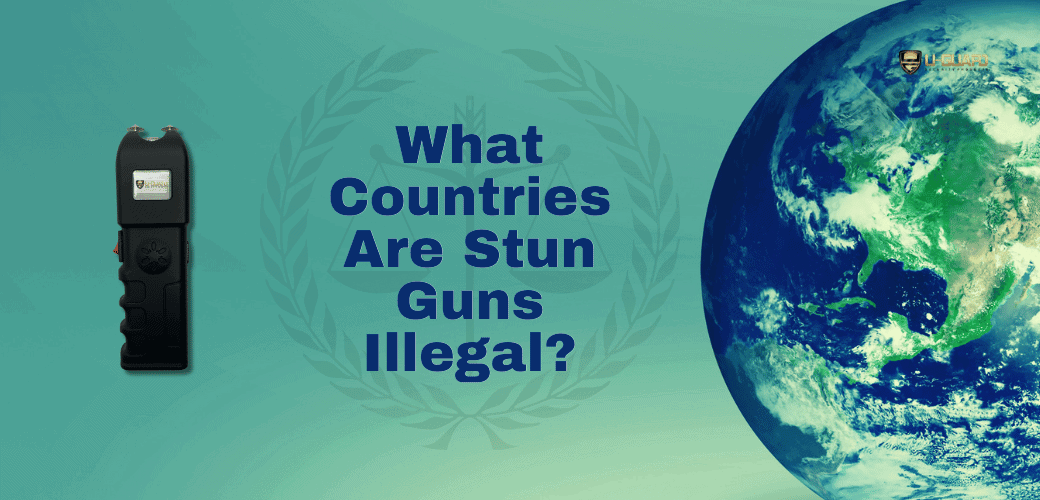Do pepper sprays expire? This question often arises among those who own pepper spray for self-defense purposes. Understanding the expiration date and effectiveness of pepper spray is crucial for ensuring your safety in case of an emergency. In this blog post, we will delve into the world of pepper sprays and explore whether they have a born date or expiration.
The Basics of Pepper Spray and Expiration
Pepper spray serves as a popular choice for personal defense, employing the heat and irritation of capsaicin, derived from hot peppers, to incapacitate potential threats. This defense tool relies on a precise formulation of chemicals, including the key component, oleoresin capsicum, to effectively deter attackers by causing intense eye irritation, difficulty breathing, and skin discomfort. The integrity of these chemical compounds is crucial for the pepper spray’s effectiveness.
An important aspect to understand about pepper spray is its shelf life. Like many products based on chemical formulations, the potency of pepper spray diminishes over time. Factors such as the purity of the capsaicin, the quality of other ingredients, and the canister’s seal integrity play significant roles in determining the lifespan of a pepper spray unit. The expiration date marked on the canister reflects the manufacturer’s guarantee of the product’s maximum effectiveness period. After this date, the spray may not produce the intended effects with the same reliability as when it was first manufactured.
This degradation is a natural process, resulting from the slow breakdown of chemical bonds within the spray’s active ingredients. The environment in which the pepper spray is stored can accelerate this process. Excessive heat, direct sunlight, and exposure to air can all contribute to the faster breakdown of the spray’s compounds. Recognizing the importance of this expiration date is critical for individuals relying on pepper spray for self-defense, as the effectiveness of their protective measure is directly linked to the condition and age of the product.
The Significance of Expiration Dates on Pepper Sprays
The presence of an expiration date on a pepper spray canister serves as a crucial indicator of the product’s period of optimal efficacy. Manufacturers typically affix these dates to inform users of the timeframe within which the pepper spray is guaranteed to perform at its best. Ignoring these dates and using a canister past its prime could potentially compromise your safety in situations where self-defense is necessary. The chemicals within pepper spray, primarily oleoresin capsicum, are subject to degradation over time. This natural decline in potency is why adherence to expiration dates is paramount.
Expiration dates are not arbitrary; they are based on rigorous testing and analysis by manufacturers to ensure that their product meets safety and performance standards throughout its listed lifespan. These dates account for the stability of the product under normal storage conditions. However, it is important to note that extreme conditions can accelerate the degradation process, underscoring the importance of not only monitoring expiration dates but also ensuring proper storage of your pepper spray.
The implications of using pepper spray beyond its expiration are significant. An expired canister may not discharge as intended or may produce a less intense effect, potentially failing to deter an aggressor effectively. This unpredictability could result in a false sense of security for the user. Therefore, the expiration date is a critical piece of information that should guide users in the regular maintenance and replacement of their self-defense tools.
It is also worth mentioning that while the expiration date is a key factor in maintaining the effectiveness of pepper spray, users should conduct regular checks for physical damage or leaks. Even a canister that has not reached its expiration date may be compromised if not stored or handled correctly. In essence, the expiration date is a foundational guideline for ensuring the readiness and reliability of pepper spray, but it should be considered alongside proper care and storage practices.
Why Do Pepper Sprays Expire?
The reason behind the expiration of pepper sprays is rooted in their chemical makeup. Over time, the critical elements that make pepper spray an effective defense tool, such as oleoresin capsicum, begin to degrade. This degradation is a natural consequence of the chemical reactions that slowly take place within the canister, affecting the spray’s potency and reliability.
The active ingredients in pepper spray are sensitive to environmental factors. For instance, exposure to extreme temperatures, either too hot or too cold, can accelerate the breakdown of these compounds. Similarly, prolonged exposure to UV light from direct sunlight can alter the chemical structure of the pepper spray’s components. Even when stored under ideal conditions, the chemical bonds in the spray’s formula are subject to gradual breakdown over time. This inevitable chemical degradation is why manufacturers set expiration dates, ensuring users are aware of the product’s optimal period of effectiveness.
Understanding the science behind the expiration of pepper sprays emphasizes the importance of adherence to these dates. While it might seem like a small detail, the chemical stability of pepper spray is paramount to its function as a self-defense tool. As these components degrade, the spray’s ability to cause the intended level of irritation and incapacitation decreases, potentially compromising its effectiveness in critical situations. This underlying chemical process, unavoidable and gradual, underscores the necessity of monitoring the expiration date on your pepper spray and replacing it as needed to maintain your personal safety with a reliably effective defense tool.
Is Expired Pepper Spray Still Effective?
While the expiration date on pepper spray serves as a guideline for when its maximum effectiveness may begin to wane, the question of its efficacy post-expiration is complex. The truth is, expired pepper spray might still discharge and produce an effect on a target. However, the degree to which it can effectively incapacitate an attacker becomes uncertain after the expiration date has passed. The primary concern with using expired pepper spray lies in the unpredictable nature of its strength and reliability. Over time, the active chemicals within the canister, particularly oleoresin capsicum, undergo degradation due to environmental factors and the natural breakdown of chemical bonds. This degradation can result in a spray that is less potent than expected, which could lead to an inadequate defense response in a critical moment. Additionally, the propellant used to expel the spray from the canister may lose its efficacy, potentially causing a weak spray pattern or insufficient range, further diminishing the effectiveness of the pepper spray as a defense tool. Given these variables, relying on expired pepper spray introduces a risk that is avoidable by adhering to the recommended expiration dates and ensuring that your self-defense tools are in optimal condition. While it might be tempting to assume that an expired canister is better than no protection at all, the uncertainties associated with its performance emphasize the importance of regular replacement and proper maintenance. Ultimately, the effectiveness of expired pepper spray cannot be guaranteed, and for those who depend on this tool for personal safety, ensuring that their equipment is within its intended lifespan is a small but crucial step towards reliable self-defense.
The Role of Storage Conditions in Pepper Spray Expiry
The longevity and efficacy of pepper spray are significantly influenced by the conditions under which it is stored. Optimal storage environments can drastically slow the natural degradation process of the chemicals involved, including the crucial oleoresin capsicum. It’s imperative for users to understand that where and how they store their pepper spray can directly affect its reliability and performance.
Storing pepper spray in environments that are consistently cool and devoid of direct sunlight helps in preserving its potency. Extreme temperatures, particularly the excessive heat often found in vehicles during the summer months, can lead to the accelerated breakdown of the spray’s chemical components. Such conditions not only compromise the pepper spray’s effectiveness but may also affect the pressure within the canister, impacting its ability to spray correctly.
Similarly, exposure to UV light has a detrimental effect on the chemicals in pepper spray. Continuous exposure can alter the chemical makeup of the spray, reducing its strength and potentially rendering it ineffective when needed most. Moist environments should also be avoided as they could compromise the canister’s seal and integrity, leading to leaks or contamination of the contents.
Understanding these factors is vital for anyone relying on pepper spray as a means of self-defense. By ensuring that the spray is stored under appropriate conditions, users can extend the effective life of their pepper spray, maintaining its readiness and reliability for when it is critically needed. Remember, the care you give to storing your pepper spray reflects directly on its performance and your safety.
How to Properly Dispose of Expired Pepper Spray
Disposing of expired pepper spray requires careful attention to ensure environmental safety and prevent any potential hazards. It’s not something that can be casually discarded in your everyday garbage or washed away down a sink. The contents of pepper spray, being chemical in nature, necessitate a more thoughtful approach to disposal.
First and foremost, consider contacting your local waste management authorities. Many communities have designated procedures for handling hazardous materials, and pepper spray often falls under this category. These facilities are equipped to manage such items in a way that minimizes environmental impact and adheres to safety regulations.
If your locality hosts hazardous waste collection days, these events present an excellent opportunity for the responsible disposal of pepper spray canisters. Participating in these programs ensures that the chemicals are neutralized and processed correctly, mitigating any risk to waste management personnel and the environment.
Additionally, some police departments or public safety offices may offer guidance or services for disposing of self-defense sprays and other similar items. Their expertise in handling these products makes them a valuable resource for information on proper disposal methods.
Before disposing of your pepper spray, ensure it’s securely wrapped or contained to prevent accidental discharge or leakage. If the canister is damaged or leaking, take extra precautions by placing it in a secondary container or bag to contain any potential spills. Always handle expired or unused pepper spray with care, even during disposal, to avoid accidental exposure to its contents.
Remember, the goal in disposing of expired pepper spray is not just to rid yourself of an unusable item but to do so in a manner that prioritizes safety and environmental responsibility. By following these steps, you contribute to a safer community and a healthier planet.
Recommendations for Regularly Checking and Replacing Your Pepper Spray
Maintaining vigilance over the condition and expiration of your pepper spray is crucial for ensuring its effectiveness as a personal defense tool. It is advisable to mark your calendar with the purchase date of your pepper spray and the expiration date indicated by the manufacturer. This simple step can serve as a reminder to assess the state of your pepper spray periodically.
Regular inspection of the canister for any signs of physical damage, such as cracks or leaks, is also important. Even a canister that appears intact but is nearing or has passed its expiration date should be replaced. Chemical degradation over time may not be visually evident but can significantly impact the performance of the spray.
Engaging in periodic test sprays in a controlled and safe environment is another recommended practice. This not only ensures the spray mechanism is functioning correctly but also helps you gain familiarity with its operation. Be mindful to conduct this in an outdoor space, away from pets or other people, to avoid unintended exposure to the spray.
Additionally, keeping abreast of the latest advancements in pepper spray technology can be beneficial. Manufacturers continuously innovate, offering products with enhanced features, such as improved spray patterns or additional safety measures, which could provide superior protection.
In conclusion, adopting a proactive approach to monitoring and replacing your pepper spray will help guarantee that you have a dependable defense mechanism at your disposal. Staying informed, prepared, and practicing responsible ownership will empower you to use your pepper spray effectively, ensuring your safety and peace of mind.
Always consider the legal use of pepper spray and is pepper spray legal in your state, county or city? It is best to contact you local police department for the exact laws regarding civilian use and ownership of pepper spray for safety, protection, and personal self defense.





